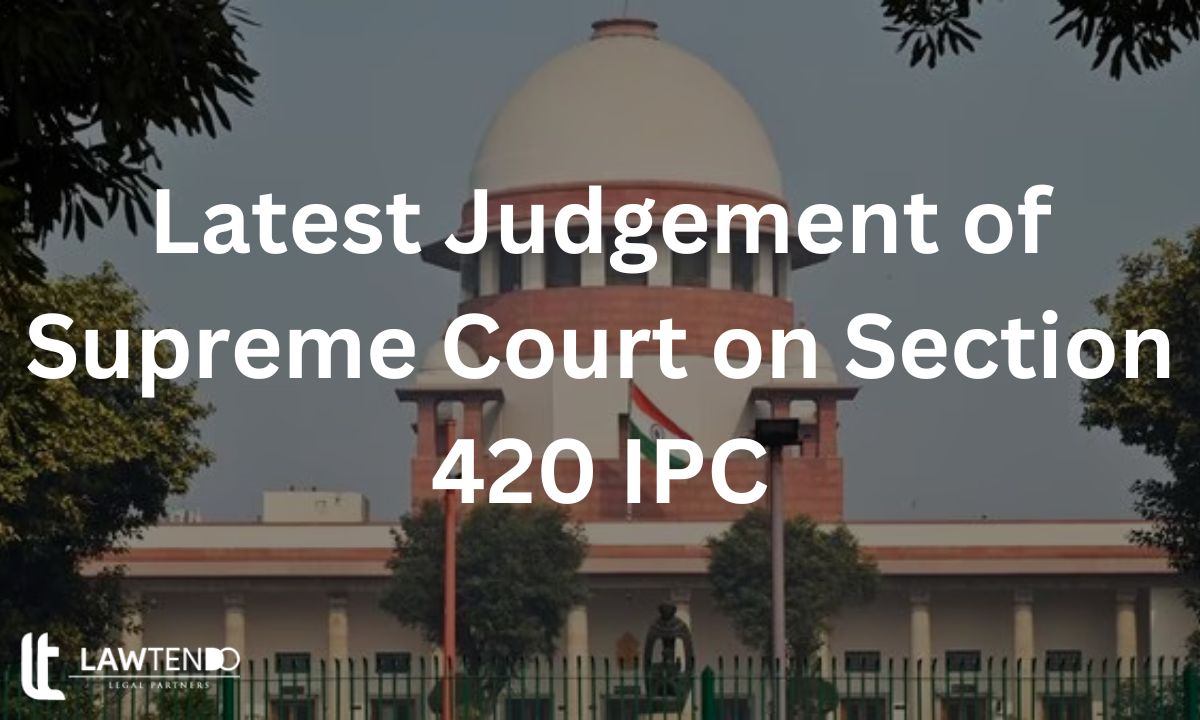Latest Judgement of Supreme Court on Section 420 IPC

Date : 06 Dec, 2023
Post By admin
The crime of deceiving someone into delivering something they shouldn't has its own section, Section 420 of the Indian Penal Code (IPC). It is imperative to comprehend the language, components, and implications of this provision in relation to the larger legal framework of India in order to conduct a thorough analysis. Cheating is a crime covered by Section 420 of the Indian Penal Code (IPC). It declares: "Anyone who commits fraud by tricking or coercing someone into doing or not doing anything that harms, or perceives him as harming, any person or thing, will be penalized with a term of imprisonment that may reach one year, a fine, or both.
The Language of Section 420 IPC:
The language of Section 420 of the IPC reads, "Whoever cheats and thereby dishonestly induces the person deceived to deliver any property to any person, or to make, alter or destroy the whole or any part of a valuable security, or anything which is signed or sealed, and which is capable of being converted into a valuable security, shall be punished with imprisonment of either description for a term which may extend to seven years, and shall also be liable to fine."
Elements of Cheating:
To constitute the offense of cheating under Section 420 IPC, the following elements must be present
- Deception or Inducement: The complainant had to have been tricked or persuaded to do or not do something by the accused. While inducement entails convincing or influencing someone to do something, deception entails presenting information falsely.
- Prejudicial Act: The act or inaction of the complainant must have been detrimental to him or to any other person or object. To be prejudiced is to do harm or cause loss.
- Dishonest aim: The accused must have acted with the knowledge that it will harm the complainant or any other person or thing, and with the aim to deceive or induce the complainant.
Scope of Terms: Property and Valuable Security
Property:The term "property" encompasses a wide range, including tangible assets, money, and intangible assets.
The focus is on the wrongful acquisition of these properties through deceptive means.
Valuable Security:
"Valuable security" includes instruments like promissory notes, bonds, and other financial instruments holding pecuniary value.
Any act leading to the alteration or destruction of such securities falls under the purview of Section 420.
Legal Consequences and Punishment
Section 420 prescribes stringent penalties to reflect the gravity of the offense.
Offenders may face imprisonment for a term extending up to seven years, coupled with fines as part of the penalty.
Application and Legal Precedents
Courts play a pivotal role in interpreting and applying Section 420 to specific cases.
Legal precedents set by earlier judgments contribute to shaping the evolving jurisprudence surrounding this provision.
Safeguarding Trust and Integrity
At its essence, Section 420 serves to protect against fraudulent activities that exploit trust and confidence in transactions.
It underscores the importance of honesty and integrity in dealings and transactions.
Staying Informed: Jurisprudential Evolution
As with any legal provision, staying informed about judicial developments and interpretations is crucial.
It ensures a comprehensive understanding of Section 420 in the ever-evolving landscape of legal contexts.
Latest Judgements
Here are some of the latest judgments of the Supreme Court of India on Section 420 of the Indian Penal Code (IPC):
Ramesh Kumar vs State of NCT of Delhi (2023): The Supreme Court observed that there is a "disquieting trend" of cheating cases under Section 420 IPC becoming money recovery proceedings. The Court cautioned High Courts and trial courts against being "unduly swayed" by lawyers who demand the amount in dispute as a deposit for granting anticipatory bail.
Criminal Appeal No. 1116 of 2023 : Supreme Court of India (2023): In this case, the Supreme Court upheld the decision of the High Court to summon the accused to face trial for offenses under Sections 420, 465, 466, 467, 468, and 471 read with 120B IPC. The Court observed that the prosecution had established a prima facie case against the accused for the alleged offenses.
State of Bihar vs Ashok Kumar Jain (2022): A two-judge bench of the Supreme Court interpreted Sections 415 and 420 of the IPC to hold that fraudulent or dishonest intention is a precondition to constitute the offence of cheating. However, the Court held that the material placed on record prima facie disclosed ingredients of offences under Sections 405 and 420 of the IPC.
Anil Kumar vs State of Madhya Pradesh (2022): The Supreme Court held that the mere failure to repay a loan or return borrowed money does not constitute cheating under Section 420 IPC. The Court observed that the prosecution must prove that the accused had the intention to deceive or cheat the complainant from the very beginning.
Praveen Kumar vs State of Punjab (2022): The Supreme Court held that the offence of cheating under Section 420 IPC is not committed if the accused subsequently performs his part of the contract. The Court observed that the offence is complete once the accused induces the complainant to deliver property or do or omit to do anything by deceiving him.
Conclusion :
In conclusion, Section 420 IPC stands as a sentinel against deceptive practices, emphasizing the core values of honesty and fairness in transactions. Its application, influenced by legal interpretations and precedents, continues to shape the contours of justice in cases involving cheating and dishonest inducement. The offense of cheating under Section 420 IPC is considered complete once the accused induces the complainant to deliver property or do or omit to do something by deceiving them. Subsequent fulfillment of contractual obligations by the accused does not negate the offense.
The interpretation of Section 420 IPC is constantly evolving, and it is essential to stay up-to-date on the latest case law. The Supreme Court's judgments play a significant role in shaping the understanding and application of Section 420 IPC.






naushad alam